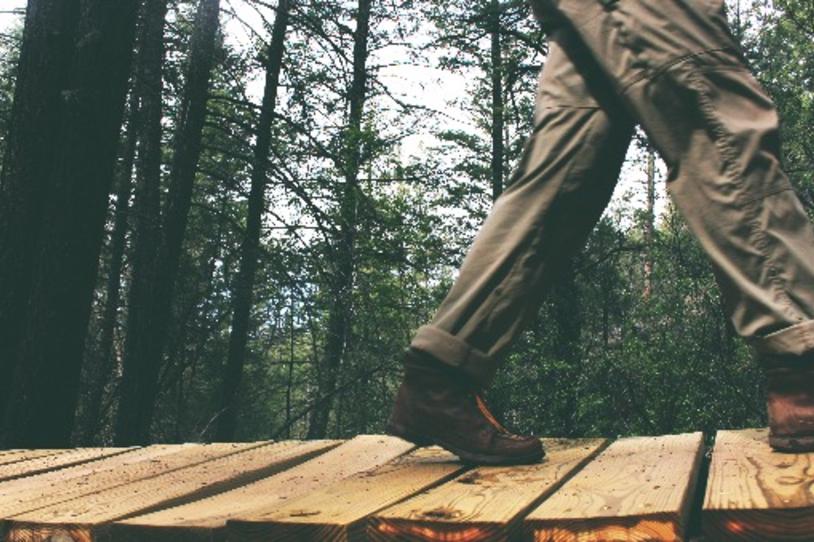
For people with Parkinson’s, falls can happen all too easily. There are several tried-and-true ways to reduce the risks of falls, many of which you’ve likely heard of: exercise to build strength and improve balance, or adjusting medications that can contribute to dykinesia, or slowness. You can also make your home safer by removing tripping hazards such as loose rugs or cords, and by improving lighting.
But can your diet and other lifestyle factors also help reduce your risk of falls or fall-related injuries? It is possible, according to physical therapist Chris Tolos and physician associate Nhi Do, who shared their lifestyle tips for fall prevention at the 2024 American College of Lifestyle Medicine annual conference.
Below are some simple lifestyle changes that can help reduce fall risk for people with Parkinson’s.
Eat Enough Protein
As people age, muscle mass naturally decreases. This can contribute to weakness, fatigue and falls. The body needs protein to build muscle, so adding more of it to your diet can help.
The recommended daily amount of protein is 0.8 grams per kilogram of body weight. For someone who weighs 150 pounds (68 kilograms), that’s 54 grams of protein per day. Many of us equate protein with meat, like chicken or fish. But don’t overlook plants. Lentils, beans, tofu, quinoa, oats and green peas, are excellent sources of protein. If you’re newer to plants, swap half of the meat in your recipes for lentils or beans, such as in spaghetti sauce or chili.
For people with Parkinson’s, dietary protein can interact with levodopa, meaning it does not kick in as fast or work as long, or at all. If you experience this, take medication at least 30 minutes before eating protein or save most of your protein for the last meal of the day, when it may be easier to navigate a reduced medication benefit.
Drink Lots of Water
Dehydration can lead to dizziness, fatigue, weakness and falls. Some people with Parkinson’s have a drop in blood pressure when standing (orthostatic hypotension), which can also cause dizziness and falls.
Staying hydrated can help. Aim for at least six full glasses of water per day, remembering that some people may need a little more or less. If you have trouble drinking that much, make it a habit by combining your water intake with a daily activity. Drink a glass of water while waiting for the coffee to brew or right after brushing your teeth. Try drinking from the same bottle or container so you can track your intake. Eat lots of fruits and veggies, which have high water content.
If you wake up to use the bathroom at night, limit fluids in the afternoon. That can help you sleep more soundly and limit the potential for falls in the dark.
Get Vitamin D
Vitamin D is the building block for stronger bones. Many people with Parkinson’s have low levels of this vitamin. This can lead to bone loss and an increased risk of fractures with falls.
The general recommendation for vitamin D is 800 IU per day. Get your level checked with a blood test. If it’s low, there are several ways to boost your vitamin D level. Sunlight is a natural source of vitamin D, so spending a short amount of time in the sun may help. Ask your doctor or dermatologist how much time you should spend in the sun and at what time of day. Also consider foods that are high in vitamin D, such as salmon or trout, or that have added vitamin D, such as orange juice and milk.
Watch Alcohol Intake
Even a small amount of alcohol can impair balance and increase the risk for falls. It can also interfere with sleep, and poor sleep is also associated with increased imbalance, reaction time and falls.
If you don’t drink alcohol, there’s no health-related reason to start. If you do drink, keep it moderate: a max of one drink per day for women and two per day for men.
Manage Stress
Stress can lead to tighter muscles, which can restrict movement and impair balance. It also might be distracting, making us less aware of our surroundings and more likely to trip. We often rush when we’re stressed, which can also push us to move at speeds or in ways we’re not accustomed to.
Where possible, give yourself plenty of extra time to get ready or get somewhere so you don’t have to rush. Experiment with ways to limit stress to find what works for you, such as deep breathing, journaling, watching funny videos or listening to a calming song — whatever helps you relax is good for reducing stress.
Read more tips for managing falls with Parkinson’s.
Many thanks to Chris Tolos, MSPT, CFPS, CPT, DipACLM and Nhi M. Do, MPAS, PA-C, IFMCP, RYT-200, DipACLM for their tips and review of this article.